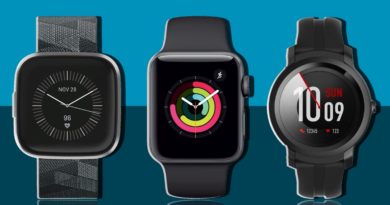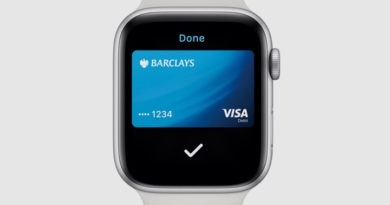Best 4G/LTE smartwatch: cellular picks from Apple, Samsung and more
Gone are the days when smartwatches relied on a Bluetooth connection to your smartphone – there’s now plenty of devices to pick from if your top priority is 4G/LTE.
These cellular smartwatches are still in their relative infancy, but that doesn’t mean you have to compromise on quality; some of the best overall smartwatches offer standalone support.
Below, we’ve rounded up our picks of the bunch that you can buy in 2020, as well as some more information on what exactly you get with an LTE smartwatch.
Update: We first published this article in August 2017 and continue to update it regularly. In January 2020, we re-ordered our picks and included the Samsung Galaxy Watch Active 2.Standalone smartwatches: Things to considerIf you’re in a muddle about just what a cellular smartwatch actually is, we’ve got the key details you need below to quickly get you up to speed.
What can a cellular smartwatch do?In smartwatch terms, having one with a 4G/LTE cellular connection allows you to link to your carrier’s data plan without the connection of your phone.
This means you can take calls, listen to music, use apps, send messages and take part in all the other usual smartphone frivolities, just, you know, without your phone being present.
In order for a smartwatch to mimic your phone, it has to be able to connect to the same network carrier. And if you want to take calls, you’re also required to link the same number as your smartphone.
Do I need to switch my SIM card over?No. Instead of having to carry a SIM ejector around with you and deal with a physical card, some watches use eSIM technology, which is essentially an embedded variant that can’t be moved from the hood.
The benefit of this tech over regular SIM cards is the smaller size – companies are already trying to reduce size, so this is a natural step – and the efficiency of sharing your number between phone and watch through software.
Do you have to pay a monthly fee?This all depends on the carrier you decide to go with, but, usually, yes.
However, deals will often be bundled with a smartphone, since you need to be rocking the same network and the two go hand in hand.
Does using LTE affect battery?Deciphering which sensors and what activities affect your battery is always a tough game, but the answer is, well, yes – using LTE will generally sap your battery faster than if you weren’t using it.
What we often see from devices with LTE is a bigger battery (and a bigger build) in order to offset the power it’s taking up.
If you’re looking to save battery and eke out a few more hours in the day, simply switching to a feature-slimmed mode on your device should help you out.
1. Apple Watch Series 5 (GPS + Cellular model)The Apple Watch Series 5 is the best smartwatch you can buy in 2020 – and part of the appeal comes with its excellent standalone support.
Not only can you make calls, take calls and receive notifications, thanks to that built-in eSIM, but streaming tunes via Apple Music is also available right from the wrist. Since the feature was first introduced in the Series 3, we’ve found the LTE coverage to be both consistent and reliable.
Set it up: How to use LTE on Apple WatchAside from the cellular support, the Series 5 itself represents more of an incremental update to the Apple Watch line, with the most substantial upgrade coming in the form of the Always On display.
ECG is still available to track your heart rhythm and potentially spot atrial fibrillation, and the design, aside from the new display, is the same as the previous generation.
Naturally, you ca buy the device without the LTE package, but this undoubtedly gives you the fullest experience and can free you from your phone during runs, when your phone battery dies and whatever else.
Read more on LTE performance in use in our Apple Watch Series 5 review. Price when reviewed: From $4992. Samsung Galaxy Watch (4G LTE model)The Apple Watch may be the top option for those on the hunt for an LTE smartwatch, but, particularly for those with an Android phone, the Samsung Galaxy Watch is the next best pick.
With LTE available for both the 42mm and the 46mm model (shown above), the flagship Samsung smartwatch is one of the few that can stack up in pretty much every area (besides perhaps health monitoring) with the Apple Watch.
For the most part, we found LTE performance in use to be fairly consistent, but there is potentially a bit of a battery draining issue – more than you might find on the Apple Watch, say.
However, streaming music from Spotify and calling is smooth through the Tizen watch, and it has beautiful design, elite-level display and all the smartwatch basics you could want for, such as notifications, contactless payment support, GPS activity tracking and waterproofing.Just keep your eye out for the potential arrival of the Samsung Galaxy Watch 2, with some early leaks suggesting it could be arriving in 2020.
Until there’s a new flagship to consider, read more in our Samsung Galaxy Watch review.Price when reviewed: From $379.993. Samsung Galaxy Watch Active 2 (4G LTE model)After initially launching without an LTE edition, you can now buy the Samsung Galaxy Watch Active 2 with full cellular support – even if it does cost a whopping $150 more than the Bluetooth version.
In terms of standalone support, there’s no difference between this and the Galaxy Watch above – you get all the same coverage and, in the US, it’s available through Sprint, AT&T, T-Mobile, US Cellular and Verizon. We just gave the Galaxy Watch a slight edge due to the wild jump in price between Bluetooth and LTE editions.
Really, if money is no concern, the choice between Samsung’s smartwatches is about whether you prefer the design of the sportier Active 2, which comes in either a 40mm or 44mm case size.
It’s certainly an upgrade over the now-cheaper original (which only came out a few months before), with the digital rotating bezel making its debut, but you may prefer the Galaxy Watch’s more ‘classic’ smartwatch look.
If you do opt for the Active 2, you can also look forward to Samsung’s first foray into ECG readings, too, with the feature currently going through regulatory checks before being set live.
Read more in our extensive Samsung Galaxy Watch Active 2 review. Price when reviewed: $449.994. Apple Watch Series 3 (GPS + Cellular model)The first Apple smartwatch to receive cellular support is also still a very viable option – and is one of the cheapest on this list.
Coverage works in the same way as it does on the newer models – meaning you can make calls, receive notifications and stream from Apple Music – and the upgrade to the cellular model starts at $100 over the Bluetooth equivalent.
What does the Series 3 lack that the Series 5 has? Well, it features the older, boxier design without the perk of an always-on screen, and it can’t provide health tracking highlights like ECG readings.
That said, for those who are most interested in the prospect of cellular connectivity from the wrist, this is a great smartwatch. It runs on the same watchOS 6 software as the latest models, and you still get all the core features, such as GPS activity tracking, standalone apps and notification support.
Read all about the LTE performance in our Apple Watch Series 3 review.Price when reviewed: From $299.995. Garmin Vivoactive 3 Music (Connected by Verizon)Garmin has largely stayed out of the LTE crowd, with the Vivoactive Music 3 the only device in its wide arsenal to offer cellular support.
There’s now the Vivoactive 4 to consider, but, as of writing, it doesn’t have an LTE version for you to buy. And while we do expect that to change in 2020, this is Garmin fans’ only option for now.
There’s a fairly big caveat with this device, though, other than the fact it may soon be superseded. Firstly, the LTE features are exclusively available through Verizon.
If that suits you, you’ll be able to receive texts and download music from Spotify and Deezer without your phone. The more interesting use, however, is that Garmin is using cellular for safety features.
There’s both assistance and incident detection, both of which could be useful in a pinch if you’re out hiking as many Garmin wearers are likely to be.
Otherwise, your regular Garmin features are present, from Garmin Pay to detailed fitness tracking. And this is a really solid pick, despite having a bit more to consider before buying.
Check out more on this smartwatch with our full Garmin Vivoactive 3 Music review.Price when reviewed: $2996. TicWatch Pro LTEThe TicWatch Pro 4G/LTE is Mobvoi’s entry into the world of LTE smartwatches, in partnership with Verizon in the US.
Despite the support not being available at launch, the 4G switch has been flicked and now the Pro has those extra connected powers.
Now that it is, the Pro will let you take VoLTE calls and send and receive messages straight from the watch. You’ll get notifications from other apps, too, thanks to the watch’s cloud syncing.Aside from the LTE, you can expect a pretty standard Wear experience here. The experience doesn’t quite compete with what Samsung and Apple can offer, but it’s definitely an option for those with an Android phone that prefers Google’s Wear OS to Tizen.
Check out our initial hands-on with the TicWatch Pro 4G/LTE for more details on the watch.Price when reviewed: $299


